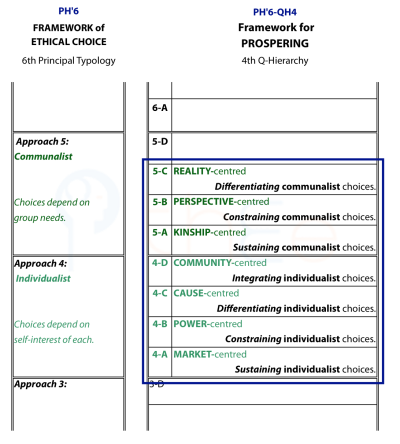Government v Wealth-Creation
Ethical Conflict of Interests
The ethics of government intervention in the economic life of a society flows from the psychosocial reality that: all energy and creativity in regard to generating wealth comes from productive individuals in society.
 To Repeat the Obvious
To Repeat the Obvious
While governments can undoubtedly do a lot for good or ill, the idea of a government «managing the economy» or even «fine-tuning it» is simply ridiculous. A complex thing like society with its myriad of human interactions around wealth-creation is far more easily disrupted or damaged than improved. While governments can easily stop or distort creative or energetic activity, no government can force creative activity or make someone exert themselves at maximum capacity over a long period of time.
So governments are pushed in two ways by their own interests:
- to focus on economic activities on which they depend i.e. communalist type of ethical choice, because:
 no government likes to preside over an economic collapse with potential for instability. Concern for a thriving contented populace is a communalism born out of necessity.
no government likes to preside over an economic collapse with potential for instability. Concern for a thriving contented populace is a communalism born out of necessity.
- to focus on their own self-interest i.e. individualist type of ethical choice, because:
 actions taken in regard to markets, industries, spending, taxing, and public services directly affect the likelihood of government representatives being returned to power.
actions taken in regard to markets, industries, spending, taxing, and public services directly affect the likelihood of government representatives being returned to power.
» See more on the 7 types of ethical choice.
Styles of Individualist and Communalist Choice
 THEE Note:
THEE Note:
Ethical choices made by a government follow the same four-level pattern identified in the frameworks for cooperation and for marketing. It is an internal duality, which is a property of the underlying framework. So it should emerge again here: and it does.
■ The first four levels are individualist:

L1 (4α): In valuing commerce and enterprise, society’s economic activity sustains governments i.e. governments depend on entrepreneurs and productive individuals to produce wealth for them to tax and spend.
entrepreneurs and productive individuals to produce wealth for them to tax and spend.
L2 (4β): In enforcing laws and regulations, markets can function well so that society’s economic activities constrain governments i.e. markets produce outcomes that put limits on what governments can do or claim, which is one reason why governments continually distort the workings of markets.
put limits on what governments can do or claim, which is one reason why governments continually distort the workings of markets.
L3 (4γ): In adapting capitalism, society’s economic activity differentiates governments i.e. governments differ because of the particular beliefs/values/principles that are promoted within their society.
of the particular beliefs/values/principles that are promoted within their society.
L4 (4δ): In intervening strategically, society’s economic activity integrates governments i.e. government interventions mean that the government itself becomes a crucial part of society’s economic processes, and individuals must understand and handle government participation as best they can while they strive to prosper personally.
that the government itself becomes a crucial part of society’s economic processes, and individuals must understand and handle government participation as best they can while they strive to prosper personally.
■ The next three levels are communalist:
L5 (5α): In attending to their citizens and caring about local industries, a government sustains economic activities within society; i.e. governments desire that economic activity and employment should be continuous and not disrupted; and wish to avoid widespread insolvencies and bankruptcies.
economic activity and employment should be continuous and not disrupted; and wish to avoid widespread insolvencies and bankruptcies.
L6 (5β): In evaluating economic performance, a government constrains economic activities within society i.e. the types of analysis performed and information released affect what individuals and the government will do and so shape or limit choices taken in response.
what individuals and the government will do and so shape or limit choices taken in response.
L7 (5γ): In facing economic realities, a government differentiates economic activities within society; i.e. governments have options in what is faced that differentially affects supporting or inhibiting particular types of economic activity e.g. trading, saving, expanding, investing, lending, borrowing, planning &c.
that differentially affects supporting or inhibiting particular types of economic activity e.g. trading, saving, expanding, investing, lending, borrowing, planning &c.
Originally posted: Q3-2009
